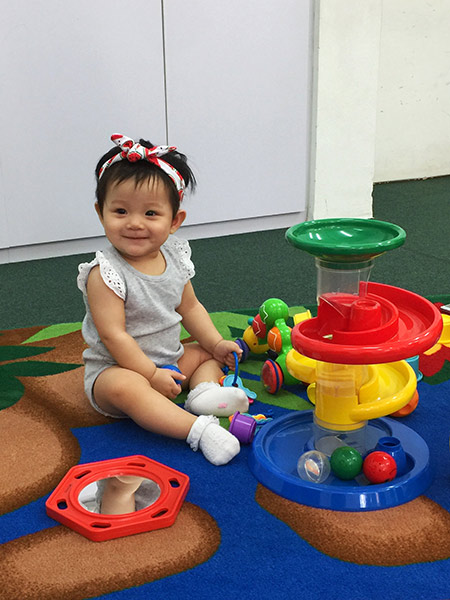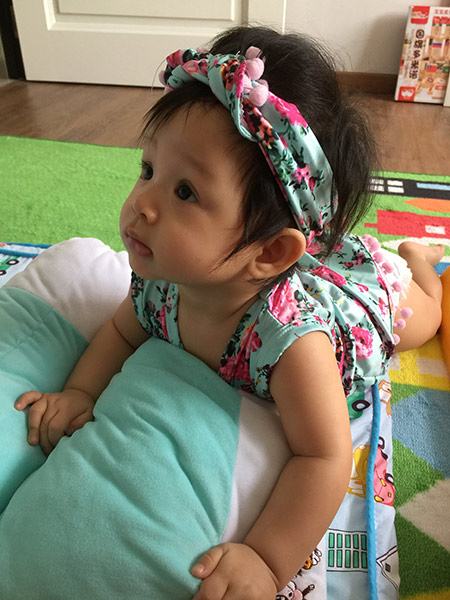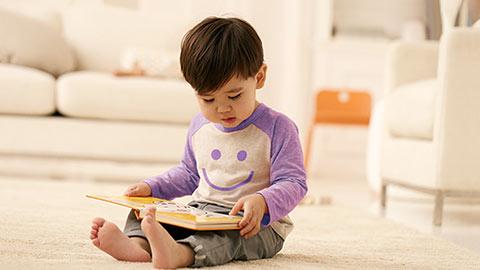Nadia Yeo shares her experience, tips and tricks.

So it's been several months since your baby arrived and turned your world upside down in an amazing yet exhausting way. After six months, you soon begin to realise that your baby cries almost immediately after food, appears uncomfortable and unhappy, shows excessive spitting up, wouldn't nap unless she was being held, and wasn't gaining weight.
You are at a loss over what to do, with no clue how to soothe her and you wish that someone would tell you what the problem is and how to solve it. Don't worry, you're not alone. Your baby may have a delicate tummy and once you have identified the signs, there are several things that you can do to help and calm her down, making the both of you feel better!
First-time mum Nadia Yeo shares with us how she found out that her daughter, Sophia, had a fussy tummy, shares a snapshot of her day-to-day experience, while giving tips on how to soothe a fussy child.
A day in my life as a mom
7am – Sophia wakes up, sits upright, babbles to herself before bonking me on the head with her tiny fists. When that fails, she would crawl over and try to wake me up. Hello day!
8am – Sophia is brought to her play den. She's now 9 months old and is very active; crawling and trying to stand on her own. This is the age where she is starting to develop her linguistic intelligence, so I'll read her some books; a different language for each day.
9am – Sophia begins to cry and she can't be pacified. It's time for breakfast. She is very grumpy - gas, is a big source of fussiness for her She becomes harder to handle whenever she experiences discomfort. I try to calm her with a relaxing bath before a stroll around the park. Seeing trees and the external environment turns out to be a great distraction, she finally stops crying and looks with curiosity at the world.
10am – Nap time at last! An hour later, Sophia wakes up and continues to play while I sing nursery rhymes to her. She starts to cry which is a sign that she is hungry again, but it's a little too soon for the second feed and she still hasn't done number two.
Noon - We get ready to head to the library or museum. I'm always reminded of the boy scouts' motto when I pack to head out with the baby: "Be prepared!"
1pm – It's lunch time and I made preparations to feed Sophia. I head to a quiet corner at the museum to settle down and feed her. As a distraction and to keep her entertained, I tell her a story while feeding her. It works; she's fascinated by the pictures. An hour later, she falls asleep.
4pm – I'm called to attend a meeting at the last minute. Sophia is still with me. Guess I'll just have to bring her with me. Thank goodness for teething toys, which will help to keep her preoccupied through the meeting.
5pm – The meeting has ended and we now make our way back home. She's starting to be fussy as she's getting tired and starting to get hungry again.
6pm – Home at last! It's now time for her evening bath and her fourth and final feed for the day. She's tired and hungry – the worst combination. She starts crying; her tummy is hard and filled with gas again; a sign that she's constipated. My husband is back from work and he carries her around the house trying to calm her down. It works! She just wants to be held.
8pm – It's finally the end of the day and we put Sophia to bed. She falls asleep quickly. The poor girl must be tired. We will need to find a solution to solve her tummy problems.
My baby has a delicate tummy, what do I do?

Sophia was a colicky baby from the outset, she was more prone to being gassy than other babies. When she was slightly over six months, we noticed that she had great difficulty passing stool after each feed and we could see her straining to go after meals. Whenever Sophia was constipated, she would cry and wail. It is rather heart-breaking looking at your baby in distress. After talking to other mothers and her paediatrician, we found that Sophia had a fussy tummy as her digestive tract was still developing, and that made her prone to gas, which often caused discomfort.
Life with my fussy baby

It's never easy dealing with a fussy baby, but life goes on. Once you have identified that your little one has a delicate tummy, you can very easily turn this unhappy tummy into a happy one. Here are a few simple tips that I've learnt throughout this experience:
-
Stick to a routineWith a grumpy baby, sticking to a routine is extremely important as it provides your little one with some degree of comfort from the familiarity of activities and faces.
-
Support for mummy from loved onesThe support of a loved one is important and a big source of help, comfort and support. My husband, for example, is very much involved in the parenting care of our little girl and has truly been a rock in this wonderfully challenging journey.
-
Keep calmWhile it may be hard, try to keep calm. Babies typically fuss because they are tired, hungry or uncomfortable. They are also very sensitive to their parents' emotions so try to be calm when dealing with a crying baby1.
-
The right environmentAs your child grows, they become easily distracted by shapes and colours that they see in their surroundings. Feeding sessions therefore easily turns into a challenging wrestling match if your baby isn't eased in properly. We found that finding a room free of distractions to feed the baby in helped a lot; that meant no bright lights or toys, dimming the lights and ensuring that room temperature remains cool.
-
Nutrition for 360 developmentHaving a baby with a sensitive tummy, it's important to establish a diet that provides all necessary nutrients to support your child's 360 development.
Note : Breast milk is the best for babies. The World Health Organization recommends exclusive breastfeeding for the first six months of life. Unnecessary introduction of bottle feeding or other food and drinks will have a negative impact on breastfeeding. After six months of age, infants should receive age-appropriate foods while breastfeeding continues for up to two years of age or beyond. Consult your doctor before deciding to use infant formula or if you have difficulty breastfeeding.
Reference:




